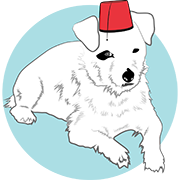Writer Jan Hoadly responded to yesterday’s post with a story called “Dog Breeding — Associations and Opinions” on the Associated Content site, adding some definitions to the mix.
One thing I’d like to clarify about Hoadly’s characterization of my position: I only said I preferred professional breeders in my original Twitter post because of ignorance, because I had a definition in mind that has proved to be different than the one that many dog people commonly accept. As Hoadly puts it in her piece:
“Backyard” or “hobby” or “professional” is an image in our own heads. People criticize or praise the image in their heads.
Another response that I got to my call for information was from a self-described hobby breeder, who submitted the following definitions — anonymously. I don’t blame her for not wanting her name to be made public. As I’ve discovered, this is a topic on which few people are neutral.
Professional breeder
Professional to me means that you are making a living exclusively from breeding dogs. This not an inexpensive venture. Figure a middle class income is roughly $52,000 a year. At $1000 per puppy, with an average litter of six, calculate that two puppies would just about cover expenses. So you would need to breed 13 litters per year or over one a month to make a profit. Dogs only cycle twice a year, so you are looking at multiple litters on the ground at the same time. These are what the American Kennel Club calls high volume breeders. Under these circumstances, it is very difficult to keep the puppies clean and socialized to people and to home noises. The dogs live in kennels for the most part, and the breeder offers no post-sale support.
Hobby breeder or fancier
These people are involved with the breed, joining dog clubs and organizations. They prove the quality of their dogs and suitability for breeding by competing for titles and certificates. They know the depth and breadth of the breed lines and they consider health issues within the breed. They offer lots of post-sale support.
Backyard breeder
These are people looking for some supplemental income. They are not particularly educated about breeds, and are often unaware of their breed’s genetic defects. They breed only for convenience, often mixing breeds. There is no post-sale support. A typical example of this category is someone who recently confided to me at a farmers market that they bred their girl to a dog down the street to “calm her down.” Because of the economy, they could not sell all the puppies, so they took half of them to the Humane Society.
My anonymous source — I feel like Woodward or Bernstein — directed me to the Woodhaven Lab Breeders for a comparison between hobby breeders and backyard breeders.
She also sent me a personal statement about her breeding philosophy that I’ll post soon.
In the meantime, I’d love to hear from someone who considers herself or himself to be a professional breeder.

Great post! I only go to professional breeders who show dogs and are going for healthy dogs with lovely dispositions. I ask for pet quality and spay them. I know the specific breed and temperament I want and I know what fits my personality and lifestyle. Second choice: rescue. When I was young I got 2 dogs from pet stores. Poor me, poor dogs. One had the kind of mange that people could catch. I did — I was miserable. Then its eye gland popped out. The other was a stupid dog who chewed through walls. Lessons learned.
Thanks for your response. But here’s where the trouble comes in: What you refer to as a professional breeder — a definition I agreed with earlier this week — others would call a hobby breeder. What’s in a name? Plenty, apparently!
So doesn’t this all scream, “Rescue!” notwithstanding the attendant difficulties and uncertainties?
Very informative! I learn new things every day.
Thanks, that’s music to my ears!